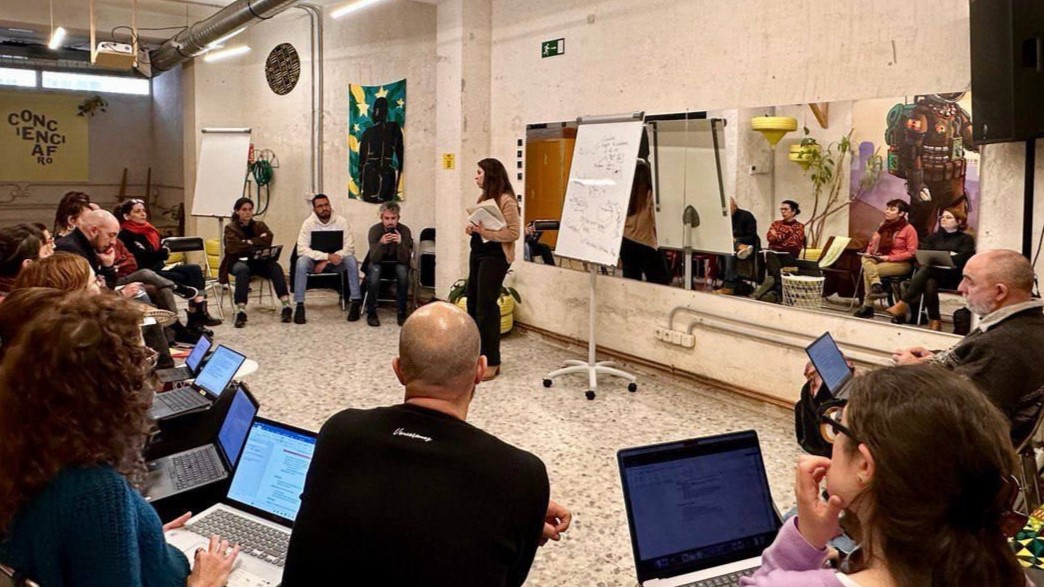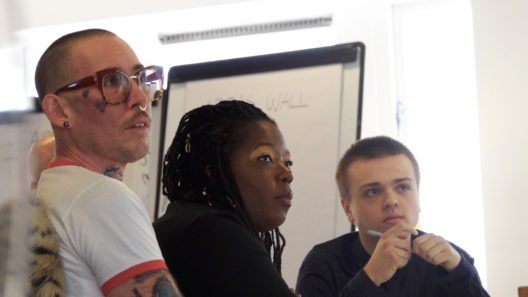Mobilising publics and grassroots organisations to impact AI policy
What can we learn from network-building initiatives in Spain?
10 April 2024
Reading time: 8 minutes

The views expressed in this piece are of the author(s) and do not necessarily reflect those of the Ada Lovelace Institute.
The perspectives of grassroots organisations working on human rights, antiracism and labour rights – among other issues – are essential in policymaking around AI. Organising at the community level can build connections and engage people, especially marginalised people, in a deep and long-lasting way. When grassroots groups involve and empower people effectively, they gain the legitimacy to represent them, something that is difficult to achieve with top-down approaches to public participation. But what does effective network-building look like? And how can we ensure that it elevates diverse voices and drives positive change?
We can learn some useful lessons about bringing together and empowering publics by looking to Spain. Over the last few years, a whole ecosystem of organisations working on issues such as social justice, antiracism and digital rights (La Fede, Algorace, Civio, Algorights, Iridia and DigitalFems – to mention only a few) has come together to form IA Ciudadana.
This network has engaged, connected and mobilised people with specific and localised issues, advocating for the democratisation of AI, designing strategies to influence policymakers in a collaborative fashion that truly engages the public.
IA Ciudadana’s journey has demonstrated that the process of building new political power is as important as that of driving policy change. Indeed, when it comes to effective public engagement, we need to expand the concept of impact to include the creation and strengthening of civil society networks. These can coordinate the efforts of multiple organisations and advocate for people in a powerful and lasting way.
In this blog post, we review key strategies for effectively convening diverse publics through grassroots networks.[i] We do this by exploring examples in which Spanish organisations with different strengths and agendas – including AI Ciudadana and its constituent members – have coalesced and achieved significant policy goals in the recent past.
Adopting a bottom-up approach to capacity building
Introducing a new topic, such as AI, into the social agenda of an existing civil society organisation is not easy. First, recognising the importance of specific knowledge (be it of the place where people live or particular economic or social contexts) is crucial for understanding both the political landscape and the cultural code that characterises relationships and modes of communication.
Moreover, the process of developing the skills and competencies available within an organisation should always be based on the premise that there are multiple knowledge bases. Each collective brings a different perspective to the same issue, be it technical or based on antiracist politics, labour rights or democratic rights.
It is also important to note that opening up spaces and processes to diverse and representative groups of people and interests is not enough to guarantee their participation. Not all people or groups feel comfortable in policy spaces, due to various forms of historical systemic exclusion as well as material barriers, such as limited resources and linguistic differences.
The first Spanish conference on AI and human rights, organised in 2020, demonstrates how understanding the perspectives of diverse groups can lead to effective capacity building. The event had the dual objective of framing AI in a way that is relevant to the social sector and building bridges between digital rights and human rights activists.
The extensive work that went into designing the programme and the methodology used for structuring the event – before, during and after – sowed the seeds of what is today the Algorights community, which aims to advocate for citizen participation in the design, development, implementation and evaluation of AI-related policies. Importantly, the organisers who cemented the Algorights initiative decided it should be led by human rights grassroots campaigners, rather than AI and technology experts and policy professionals, foregrounding their approach and knowledge.
Combining AI- and non-AI-related advocacy to improve policy
Combining AI advocacy with advocacy in other policy areas, such as social justice issues or the environment, not only allows us to understand the challenges raised by novel technologies in a more comprehensive and inclusive way, but can also facilitate activists’ access to policymakers.
This became a necessity in the context of Spain’s last government, in which all issues related to AI and digitisation were regulated by the Ministry of the Economy, a department that has never been particularly accessible to civil society organisations. By highlighting how the digital rights agenda connects to other existing agendas – like labour rights – many groups were able to successfully influence other political actors outside of the Ministry of the Economy to back meaningful policy change.
The ‘Riders’ Law’
For instance, Riders X Derechos (a self-organised workers’ rights organisation) successfully influenced the Ministry of Labour to approve the 2022 ‘Riders’ Law’. This pioneering legislation recognises delivery riders as employees, rather than as self-employed workers, ensuring salary and welfare protection as well as rights in terms of working time, according to employment law. Notably, the law also introduced the right of workers’ councils (be it unions or more informal representative bodies) to request that companies share information on all automated decision-making systems affecting working conditions.
This aspect of the ‘Riders’ Law’ applies to all sectors of work, making it an interesting policy precedent at an international level. Indeed, this new Spanish legislation has already contributed to the research of the Observatory of Work, Algorithm and Society and Workers Info Exchange, who have designed a successful advocacy campaign with specific recommendations to influence the position of the European Parliament on the recently adopted European Platform Work Directive.
Poletika
Another example of successful coalition-building beyond the AI space happened during Spain’s last general election. IA Ciudadana was one of 500 organisations to join Poletika, a platform of civil society organisations and movements that campaigns for social, environmental and democratic rights. Poletika’s membership is composed of a broad and varied range of groups that monitor and maintain a constructive dialogue with national political parties and influence the tone and topics of public and media debates during electoral campaigns. Joining the network has given IA Ciudadana an influential platform to raise AI-related issues and mainstream the notion of ‘democratising AI’ in the context of electoral politics.
Algorace
The experience of Algorace also reflects the value of combining AI advocacy with advocacy around other important social issues.
The Spanish antiracist movement has historically focused on all problems related to migration: from the deaths of migrants in the Mediterranean Sea and the obstacles posed by asylum application processes, to the use of immigration detention centres and racist policing practices. Due to the urgency of these matters and the movement’s precarious labour and financial situation, AI technologies have not been a priority on its agenda, until recently.
Three years ago, antiracist activists began to show interest in how AI is used to enforce the immigration system. This led to conversations with digital rights activists and technology experts, as well as with the funder Open Society Hub.
These exchanges focused on how to support an informal movement, such as the antiracist one, to lead the conversation and policymaking process in a complex sector like AI. Algorace, a multidisciplinary team with an antiracist and feminist approach, came together to design an ambitious yet realistic advocacy plan. This has benefited from flexible, as opposed to project-based, funding to organise with an extended community of people, respecting their ways of working and, when necessary, changing strategy according to what that community actually needs.
Through workshops and meetings with people from minoritised communities who are affected by uses of AI, the core team has been investigating the relationship between AI and race. This work has allowed them to better understand the ways that AI technologies may be harming racialised people.
The Algorace team has also invested in publishing comprehensive information about AI and its impact on racialised people and low-income communities, releasing resources like ‘An introduction to AI and Algorithm Discrimination for Social Movements’, which are written in accessible and non-academic language.
In a short amount of time, Algorace has established itself as a leading voice highlighting the risks of inappropriate use of AI, but also showing new ways of doing effective advocacy. This has already translated into policy changes. For example, Algorace has significantly contributed to the first non-legislative initiative on the uses of facial recognition and biometric data at borders in southern Spain.
Intersectional public participation as a pathway to policy change
In conclusion, working towards meaningful public participation in AI means building political power and ecosystems with people and groups that are often at the margins, especially those from minoritised and low-income communities. This involves investing time and resources in organising with them and respecting their timelines, cultural norms and languages, breaking the cycle of exploitation and oppression they may have suffered in the past. It also involves drawing connections between the AI and data issues that impact people and society, and other pressing social issues.
While in-depth and continuous engagement with the public is not always easy, the above examples from Spain show that it can be an effective way to include the voices of diverse publics in vital policy decisions.
[i] Rather than the singular ‘the public’, we use ‘publics’ which are plural, dynamic and can mobilise around shared interests.
Related content

Meaningful public participation and AI
Lessons and visions for the way forward

How we work with people
We work to enable members of the public to engage in informed and complex public dialogue about technology